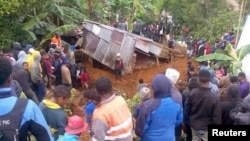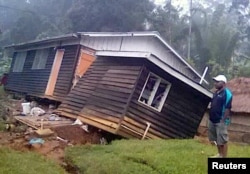Australia is flying relief supplies to earthquake-hit communities in Papua New Guinea. The aid will be the first help residents of a remote area will receive, after several days of waiting and enduring the aftershocks of the powerful quake. Local authorities say at least 50 people were killed.
More than five days after a 7.5 magnitude earthquake struck Papua New Guinea's rugged interior, aid is only just starting to arrive in some of the worst-hit regions. The Prime Minister of the South Pacific nation, Peter O'Neill, said it was an "unprecedented disaster."
His government has declared a state of emergency and parliament will be convened to address the crisis.
It is reported that up to 50 people have been killed, but more victims could be found as rescue teams reach outlying villages.
William Bando is the administrator of Hela Province. "You know, people [are] stuck in the mountains and buried in the mudslides.This earthquake has cost almost 50 lives," he said.
Aftershocks are continuing and many locals fear their homes may collapse. Roads have been cut, runways damaged and electricity supplies disrupted.
Papua New Guinea's biggest resources project is in the quake zone. Its copper and gold mining operations have been suspended. Many locals are blaming oil and gas extraction for the powerful tremor.
But Chris McKee, from PNG's Geohazards Management Division, said those fears are unfounded.
"The earthquakes are occurring well below where the oil and gas industry is operating. They are occurring at depths as much as 60 kilometers, so these are faults which are deep-seated and they are totally unrelated to the oil and gas industry. Convincing people is the hard bit.It is easy to tell them that but they want to have someone to point a finger at and blame," he said.
Australia is sending emergency supplies, including tarpaulins, water containers and purification tablets, to the disaster zone. More relief supplies will follow as the search for survivors continues. Canberra also has sent a C-130 transport plane to help with aerial surveillance of the disaster area.
Papua New Guinea is a South Pacific nation of 7 million, and is Australia's nearest neighbor.





